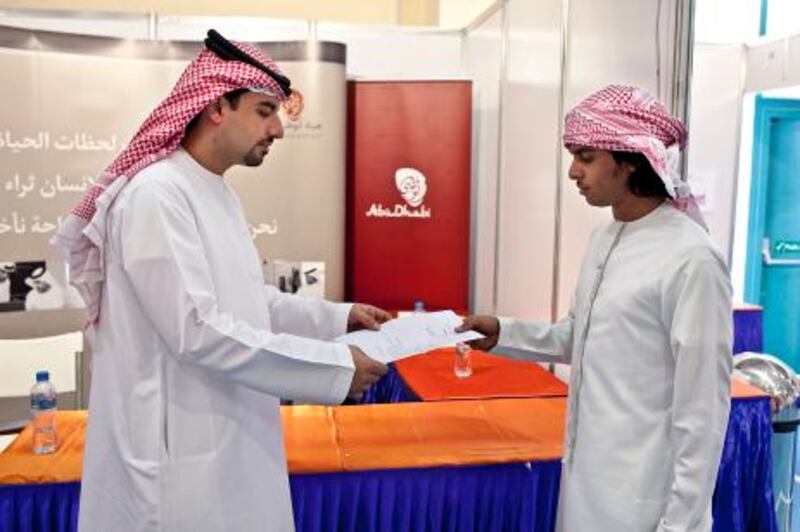ABU DHABI // Tens of thousands of jobs will be created as the Abu Dhabi Government renews its planned investments in the local economy, with employment for Emiratis a key target.
The industrial development of Al Gharbia (the Western Region) alone is expected to support 43,500 new jobs, according to ZonesCorp, the government organisation overseeing the development of Abu Dhabi's industrial zones.
Developing Al Gharbia was a priority for officials, said Mohammed Al Qamzi, the chief executive of ZonesCorp.
"We believe in the strong economic and industrial potential of the Western Region," he said. "Both Ruwais and Madinat Zayed industrial zones will present an investment opportunity for the people in the Western Region."
Jobs from the construction of the two small industrial zones are just the tip of the iceberg in a vast spending review completed by the Abu Dhabi Government.
The two zones will join a motor industry centre on the motorway between Abu Dhabi and Dubai as part of the UAE's efforts to provide employment for Emiratis.
The resumption of investment in the local economy would bring many benefits for the Emirates, creating increased activity and a boost to the emirate's flagging property sector, said David Dudley, the regional director for the property consultancy Jones Lang LaSalle.
Abu Dhabi's investments "will lead to increased gross domestic product and high-value employment growth, that in turn will boost real estate demand at these locations and more generally," Mr Dudley said.
Last week, the Abu Dhabi Executive Council finalised a review of a huge number of developments in the capital, including the resumption of work on the delayed Louvre and Guggenheim museums on Saadiyat Island and a new terminal at Abu Dhabi International Airport.
The spending review also included funding for new housing developments, schools and major new road and rail projects. Some previously announced projects - notably Capital District and Lulu Island - were absent from the list of approved developments.
Officials did not disclose the total cost of the projects.
Details of three major developments have been released. A project on a 1,400-hectare plot of land in Ruwais, aimed at providing 40,000 jobs, will focus on the construction industry, plastics, oilfield services and petrochemicals. It will begin construction in 2014.
A smaller, 2,500-hectare industrial area in Madinat Zayed targeting the logistics, oilfield services, and the food and beverage industries is expected to generate 3,500 jobs. Construction is expected to start next year, with completion expected within two years.
The capital also plans to develop AutoCity, a car service centre on the E11 motorway about 12km from Abu Dhabi island, which is intended as a key focus for the emirate's push to create jobs for nationals.
"We also aim to make the automotive industry an employment sector of choice among UAE nationals, and we are working on developing a strategy in coordination with the Abu Dhabi Tawteen Council to achieve this goal," Mr Al Qamzi said. (The Tawteen council is a government body that promotes the presence of Emiratis in the workforce.)
Construction on AutoCity is to begin by the end of this year, with completion scheduled for 2020.
All over the Gulf, governments have rolled out vast spending programmes to meet the needs of their citizens as the high price of oil sends revenues pouring into government coffers.
At the same time, they are legislating to increase the percentage of their nationals in the workforces as a huge number of young adults prepares to leave school.
Saudi Arabia has generated 300,000 jobs for its citizens since the introduction of new labour regulations in June, which denied the renewal of work permits to many expatriate workers, the Saudi newspaper Al-Eqtisadiah reported, citing the general director of the kingdom's Human Resources Development Fund.
kbrass@thenational.ae
twitter: Follow our breaking business news and retweet to your followers. Follow us





